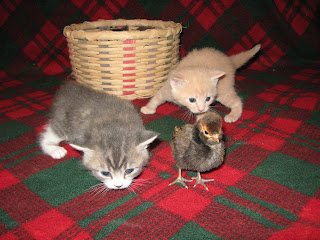Country life is great. We moved to the country over 7 years ago and have never regretted having a few acres on which to spread out and play Junior Farmer. We have enjoyed a variety of livestock at one time or another including horses, cows, pigs, goats, chickens, and rabbits. However, there are a few things that we have, how do you say, learned to live with.
One such thing is our cats. We enjoy having a few cats around to hold down the mouse population and overall we have had very few problems with mice in our home/barn. As far as the cats, we've had them all. Little ones, big ones, calico, tabbies, black ones, grey ones, black & grey ones, orange, white, part orange-part white-part black, short haired, long haired...you name the cat and we've probably had one that took up residence on our property at one time or another. Some of them we agreed to while others sniffed us out and decided we were suckers to provide them their next meal!
Each morning the routine is similar. We set a dish of cat food out on the back porch and have as many as 8 cats to dine with us at one time. Funny thing about cats though is their finicky, skittish behavior around humans which is a direct result of their socialization when they were young. Apparently kittens must be held, cuddled and otherwise pampered at a unique period of their life, somewhere between when they first open their eyes and about 8 weeks. Miss that window of opportunity to make friends with your cat and the result is a feralcat. In other words, a feral cat is one that avoids loving camaraderie, lives life unto himself, and behaves as if trust is the last thing he is willing to do. Feral cats go beyond independent. They are unable to form and significantly attach to their caretakers (i.e., those who feed them) and generally exist in their own little worlds simply surviving while avoiding any potentially affectionate relationships. Feral cats can be easily identified when humans are present. They are the ones that stand 15 feet back, while the other, more socialized, connected cats feast away at the food and intermittently rub up against human legs, purring and generally demonstrating all the feline attitude that they are famous for and makes them attractive as pets. Feral cats will have none of that nonsense. They act as if they would rather be put in a room full of pit bulls than to have one seconds worth of affectionate interaction with a human being!
This truth was demonstrated in a very real way recently when Bella, one of cats that we got at about 4 weeks of age and whom is adored by Karen and Jeffrey because of her long hair, delivered 3 kittens. The kittens were promptly snatched up and placed along with their mother in a safe location within our house. You would have thought Bella had died and gone to Kitty Heaven! She purred so loud that I thought a motor was errantly left running under our house! She confidently went outside to do her business and left us with her babies. Her entire demeanor was that of trust, affection and connection to us. This is compared to one of the feral cats who roams our back yard, has delivered multiple litters of kittens and never, ever, ever has allowed us near her or her offspring. While once named, this cat is now known simply as "The Wild Momma Cat"!
Through the years Wild Momma Cat has soften her ferality (if that's a word!). We have spent much time wooing, talking sweetly, offering her sweet assurances, and our patience. We continue to feed her and make sure that she has her own special place on our farm. After several years, Wild Momma Cat has gotten to where she can tolerate being on the back porch at the same time with us and will even eat when we are within 6 feet of her. Not exactly Bella, but for her, progress nonetheless.
Recently, while considering the behavior of our feline population, we noted the similarities between them and our experience as adoptive parents. Children too, have a window of opportunity to win their hearts and affections. Miss it and the consequences are dire. It may take years to find their trust, love and ability to connect again. They act much like our feral Wild Momma Cat who is quite willing to eat our food and enjoy the shelter of our house, but never really experience the joy of connection that is felt in a loving, no-strings-attached embrace or the sharing a toy or falling asleep knowing that you are loved in this world and not alone. Instead, feral kids seem to be locked into a state of hypervigilant anxiety, question the angle in any given situation, live life in a self-protective narcissism that precludes satisfying, meaningful attachment to others, rarely feeling the security of falling asleep encompassed by a caring family, while at the same time willing to eat the food and have a roof over their little heads.
Much more so as we have done with Wild Momma Cat, we spend our days trying to woo, talk reassuringly, and taking our best shot a patience with our children. Its obvious the window of socialization has passed and we are left with the consequences. We ask God to repair their broken hearts while we provide food, clothing and shelter. Like Wild Momma Cat, the kids show signs. An occasional "thank you" or seeing them play together successfully or doing the right thing when we're not around to see it keep us going. But taking a child who has so insulated himself against connecting with any other human being...well, it just takes time. For now, I guess we'll be happy when they just 'eat on the back porch with us'!
Until we talk again...






